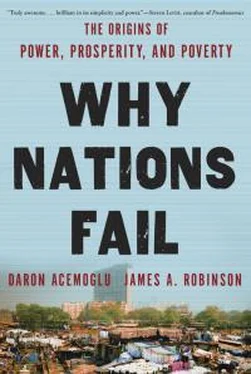Sheridan, Richard B. (1973). Sugar and Slaves: An Economic History of the British West Indies 1623–1775 . Baltimore, Md.: Johns Hopkins University Press.
Sidrys, Raymond, and Rainer Berger (1979). “Lowland Maya Radiocarbon Dates and the Classic Maya Collapse.” Nature 277: 269–77.
Smith, Bruce D. (1998). Emergence of Agriculture . New York: Scientific American Library.
Sokoloff, Kenneth L. (1988). “Inventive Activity in Early Industrial America: Evidence from Patent Records, 1790–1846.” Journal of Economic History 48: 813–30.
Sokoloff, Kenneth L., and B. Zorina Khan (1990). “The Democratization of Invention During Early Industrialization: Evidence from the United States, 1790–1846.” Journal of Economic History 50: 363–78.
Steffens, Lincoln (1931). The Autobiography of Lincoln Steffens . New York: Harcourt, Brace and Company.
Stevens, Donald F. (1991). Origins of Instability in Early Republican Mexico . Durham, N.C.: Duke University Press.
Stone, Lawrence (2001). The Causes of the English Revolution, 1529–1642 . New York: Routledge.
Tabellini, Guido (2010). “Culture and Institutions: Economic Development in the Regions of Europe.” Journal of the European Economic Association 8, 677–716.
Tarbell, Ida M. (1904). The History of the Standard Oil Company . New York: McClure, Phillips.
Tawney, R. H. (1941). “The Rise of the Gentry.” Economic History Review 11: 1–38.
Temin, Peter, and Hans-Joachim Voth (2008). “Private Borrowing During the Financial Revolution: Hoare’s Bank and Its Customers, 1702–24.” Economic History Review 61: 541–64.
Thompson, E. P. (1975). Whigs and Hunters: The Origin of the Black Act . New York: Pantheon Books.
Thompson, I.A.A. (1994a). “Castile: Polity, Fiscality and Fiscal Crisis.” In Philip T. Hoffman and Kathryn Norberg, eds. Fiscal Crisis, Liberty, and Representative Government 1450–1789 . Palo Alto, Calif.: Stanford University Press.
——(1994b). “Castile: Absolutism, Constitutionalism and Liberty.” In Philip T.
Hoffman and Kathryn Norberg, eds. Fiscal Crisis, Liberty, and Representative Government 1450–1789 . Palo Alto, Calif.: Stanford University Press.
Thornton, John (1983). The Kingdom of Kongo: Civil War and Transition, 1641–1718 . Madison: University of Wisconsin Press.
Todkill, Anas (1885). My Lady Pocahontas: A True Relation of Virginia. Writ by Anas Todkill, Puritan and Pilgrim . Boston: Houghton, Mifflin and Company.
Truth and Reconciliation Commission (2004). Final Report of the Truth and Reconciliation Commission of Sierra Leone . Freetown.
Vansina, Jan (1978). The Children of Woot: A History of the Kuba People . Madison: University of Wisconsin Press.
Wade, Robert H. (1990). Governing the Market: Economic Theory and the Role of Government in East Asian Industrialization . Princeton, N.J.: Princeton University Press.
Wallerstein, Immanuel (1974–2011). The Modern World System . 4 Vol. New York: Academic Press.
Ward-Perkins, Bryan (2006). The Fall of Rome and the End of Civilization . New York: Oxford University Press.
Weber, Max (2002). The Protestant Ethic and the Spirit of Capitalism . New York: Penguin.
Webster, David L. (2002). The Fall of the Ancient Maya . New York: Thames and Hudson.
Webster, David L., Ann Corinne Freter, and Nancy Gonlin (2000). Copan: The Rise and Fall of an Ancient Maya Kingdom . Fort Worth, Tex.: Harcourt College Publishers.
Wheatcroft, Stephen G., and Robert W. Davies (1994a). “The Crooked Mirror of Soviet Economic Statistics.” In Robert W. Davies, Mark Harrison, and Stephen G. Wheatcroft, eds. The Economic Transformation of the Soviet Union, 1913–1945 . New York: Cambridge University Press.
——(1994b). “Population.” In Robert W. Davies, Mark Harrison, and Stephen G. Wheatcroft, eds. The Economic Transformation of the Soviet Union, 1913–1945 . New York: Cambridge University Press.
Wiener, Jonathan M. (1978). Social Origins of the New South: Alabama, 1860–1885 . Baton Rouge: Louisiana State University Press.
Williamson, John (1990). Latin American Adjustment: How Much Has Happened? Washington, D.C.: Institute of International Economics.
Wilson, Francis (1972). Labour in the South African Gold Mines, 1911–1969 . New York: Cambridge University Press.
Wilson, Woodrow (1913). The New Freedom: A Call for the Emancipation of the Generous Energies of a People . New York: Doubleday.
Woodward, C. Vann (1955). The Strange Career of Jim Crow . New York: Oxford University Press.
Woodward, Ralph L. (1966). Class Privilege and Economic Development: The Consulado de Comercio of Guatemala, 1793–1871 . Chapel Hill: University of North Carolina Press.
Wright, Gavin (1978). The Political Economy of the Cotton South: Households, Markets, and Wealth in the Nineteenth Century . New York: Norton.
——(1986). Old South, New South: Revolutions in the Southern Economy Since the Civil War . New York: Basic Books.
——(1999). “The Civil Rights Movement as Economic History.” Journal of Economic History 59: 267–89.
Zahedieh, Nuala (2010). The Capital and the Colonies: London and the Atlantic Economy, 1660–1700 . New York: Cambridge University Press.
Zewde, Bahru (2002). History of Modern Ethiopia, 1855–1991 . Athens: Ohio University Press.
Zohary, Daniel, and Maria Hopf (2001). Domestication of Plants in the Old World: The Origin and Spread of Cultivated Plants in West Asia, Europe, and the Nile Valley Third Edition, New York: Oxford University Press.












